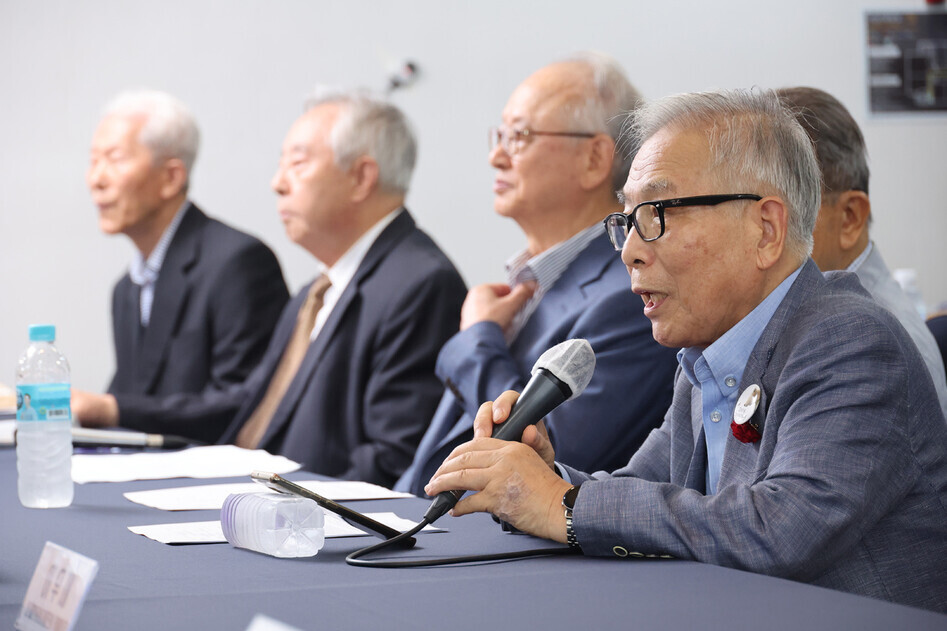hankyoreh
Links to other country sites 다른 나라 사이트 링크
Korean intellectuals say Camp David outcomes will push inter-Korean tensions to extremes

A group of respected Korean intellectuals is arguing that the agreement reached by South Korea, the US and Japan during their recent summit at Camp David to set up what amounts to a trilateral military alliance will “exacerbate the threat of war and eviscerate dialogue and cooperation for peace and stability on the Korean Peninsula.”
That was the message of a press conference held by a group of intellectuals “concerned about the threat of war and the disappearance of peace from the Korean Peninsula” at the Korea Press Center in downtown Seoul at 3 pm on Tuesday.
“A military alliance between South Korea, the US and Japan will lead to an adversarial relationship with China, Russia and North Korea and dramatically worsen inter-Korean tensions on the Korean Peninsula. We object to the three leaders integrating our countries into a trilateral military alliance.”
South Korean President Yoon Suk-yeol, US President Joe Biden, and Japanese Prime Minister Fumio Kishida defined their countries’ relationship as a partnership of “trilateral security cooperation” during their summit at Camp David last week.
The veteran intellectual observers commented that while the Yoon administration has described this form of trilateral military alliance as the “start of a new history” and a “necessary measure to preserve peace in Northeast Asia and throughout the world,” it actually amounts to an anachronistic and deceptive step backward in historical terms.
Some described it as a carbon copy of the regional military alliance that US Secretary of State John Foster Dulles tried and failed to operate during the early 1950s at the outset of the Cold War.
The intellectual observers also said that while Seoul signaled its intent to serve Washington’s interests, the plan shows no sign of preventive diplomacy to stop war from breaking out. Instead, they characterized it as a plan that only divides countries into “sides.”
They commented that the scope of the three sides’ security agreement according to their “commitment to consult” leaves South Korea in the position of having to intervene militarily or provide support in the event of a crisis in the Taiwan Strait, South China Sea, East China Sea, and other parts of the Indo-Pacific region.
They warned that the Yoon administration — which has been insisting that South Korea cannot respond to the North Korean threat on its own and requires support from the US and Japan — will only further endanger South Korea’s security.
The intellectuals noted that South Korea has already seen outpourings of disappointment and anger toward the Yoon administration over the message conveyed in the National Liberation Day address on Aug. 15, which overtly showed a capitulatory stance toward Tokyo and a hostile attitude toward democratization.
They also commented that in bilateral talks with Japan during the summit, the Yoon administration had borne out expectations by not mentioning issues related to history, territorial claims over Dokdo, the use of the name “East Sea” on maps, or the dumping of radioactively contaminated water from Fukushima.
The association of veteran intellectuals consists of 30 members, including Kwon Young-ghil, the former president of the Korean Confederation of Trade Unions; Shin In-ryung, the former president of Ewha Womans University; literary critic Yeom Mu-woong; Lee Man-yeol, the former president of the National Institute of Korean History; and the Hankyoreh’s inaugural executive editor Lim Jae-kyung.
By Kwak Jin-san, staff reporter
Please direct questions or comments to [english@hani.co.kr]

Editorial・opinion
![[Editorial] Korea must respond firmly to Japan’s attempt to usurp Line [Editorial] Korea must respond firmly to Japan’s attempt to usurp Line](https://flexible.img.hani.co.kr/flexible/normal/500/300/imgdb/original/2024/0514/2317156736305813.jpg) [Editorial] Korea must respond firmly to Japan’s attempt to usurp Line
[Editorial] Korea must respond firmly to Japan’s attempt to usurp Line![[Editorial] Transfers of prosecutors investigating Korea’s first lady send chilling message [Editorial] Transfers of prosecutors investigating Korea’s first lady send chilling message](https://flexible.img.hani.co.kr/flexible/normal/500/300/imgdb/original/2024/0514/7917156741888668.jpg) [Editorial] Transfers of prosecutors investigating Korea’s first lady send chilling message
[Editorial] Transfers of prosecutors investigating Korea’s first lady send chilling message- [Column] Will Seoul’s ties with Moscow really recover on their own?
- [Column] Samsung’s ‘lost decade’ and Lee Jae-yong’s mismatched chopsticks
- [Correspondent’s column] The real reason the US is worried about Chinese ‘overcapacity’
- [Editorial] Yoon’s gesture at communication only highlights his reluctance to change
- [Editorial] Perilous stakes of Trump’s rhetoric around US troop pullout from Korea
- [Guest essay] Preventing Korean Peninsula from becoming front line of new cold war
- [Column] The state is back — but is it in business?
- [Column] Life on our Trisolaris
Most viewed articles
- 1[Editorial] Transfers of prosecutors investigating Korea’s first lady send chilling message
- 2Korea cedes No. 1 spot in overall shipbuilding competitiveness to China
- 3Major personnel shuffle reassigns prosecutors leading investigations into Korea’s first lady
- 4[Column] Samsung’s ‘lost decade’ and Lee Jae-yong’s mismatched chopsticks
- 5[Column] Will Seoul’s ties with Moscow really recover on their own?
- 6Second suspect nabbed for gruesome murder of Korean in Thailand, 1 remains at large
- 7[Editorial] Korea must respond firmly to Japan’s attempt to usurp Line
- 8[Correspondent’s column] The real reason the US is worried about Chinese ‘overcapacity’
- 9US has always pulled troops from Korea unilaterally — is Yoon prepared for it to happen again?
- 10Naver’s union calls for action from government over possible Japanese buyout of Line